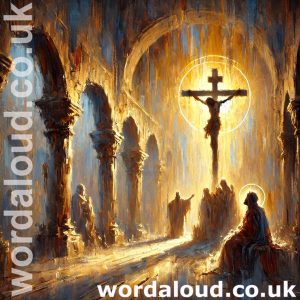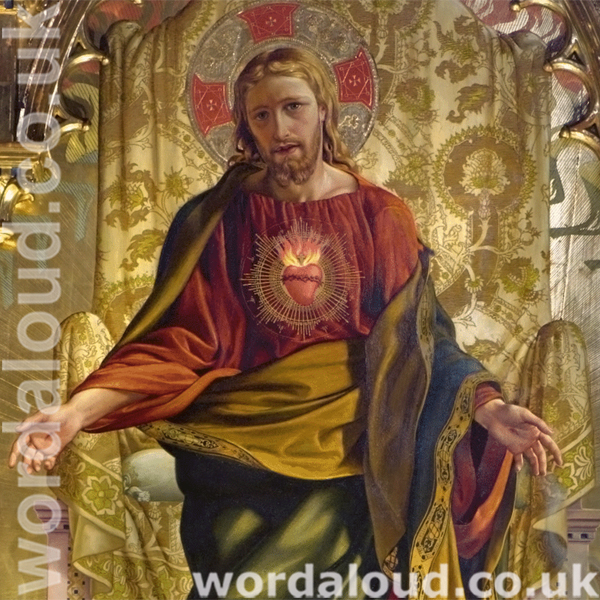Christian Art | Faith In Jesus Christ In The Temple
Office Of Readings | Week 16, Monday, Ordinary Time | A Reading From The Letter Of Saint Ignatius Of Antioch To The Magnesians | One Church, One Hope, In Love And Innocent Joyfulness | New Life In Jesus Christ
‘One church, one hope, in love and innocent joyfulness.’
This extract from Saint Ignatius of Antioch’s Letter to the Magnesians offers valuable insight into the life, belief, and structure of the early Christian Church around the beginning of the 2nd century. Written while Saint Ignatius was being transported under armed guard to Rome for martyrdom, this letter – one of seven authentic epistles – reflects his deep concern for the unity and faithfulness of Christian communities in a time of external pressure and internal challenge.
Historical And Pastoral Setting
Ignatius was bishop of Antioch in Syria and wrote this letter on route to Rome around 107 AD, during Emperor Trajan’s persecution of Christians. On his journey, he encountered representatives of the Church in Magnesia (in western Asia Minor), including their bishop Damas, whom he praises despite his youth. Ignatius’s strong emphasis on ecclesial unity and obedience to Church authority should be understood against this backdrop of vulnerability. The early Christian communities, lacking official recognition and subject to sporadic persecution, could not afford division or disunity. Saint Ignatius’ letters were intended to strengthen the churches he passed by, encouraging loyalty to their leaders and to Christ.
Church Order | Bishops, Presbyters And Deacons
Ignatius presents a remarkably developed understanding of Church hierarchy for such an early period. He likens the bishop to the presence of God the Father, the presbyters (elders) to the Council of the Apostles, and the deacons to Jesus Christ in his service. These roles are not only practical; they are theologically grounded. This triadic structure mirrors the unity of God and is intended to protect the unity of the Church.
His appeal to the Church to ‘do nothing without the bishop and the presbyters’ reflects a concern that believers might act independently, interpreting doctrine or practice without reference to the wider body. Unity was not a matter of organisational efficiency but a spiritual necessity: the Church was to be one body, acting with one prayer, one mind, one hope.
This threefold ministry became normative for the universal Church and is echoed in the writings of later Church Fathers such as Saint Irenaeus and Saint Cyprian. It helps to explain how the early Church managed to preserve doctrinal consistency and moral discipline across many local congregations.
Unity With Jesus Christ And One Another
Ignatius bases his exhortation to unity not merely on discipline, but on Jesus Christ’s own unity with the Father. Just as Jesus did nothing apart from the Father, so too Christians are to do nothing apart from the bishop and presbyters. Unity in the Church mirrors the divine communion of Father and Son. It is not accidental, but a reflection of God’s own nature.
Saint Ignatius also emphasises mutual respect, urging believers not to judge one another ‘according to the flesh’. This points to a spiritual lens for Christian community – looking beyond human weakness and recognising each person’s life in Christ. The bishop’s youth, for example, is not to be despised, because the true authority comes from God, not from age or worldly stature.
The Lord’s Day And The Christian Identity
Ignatius makes a crucial distinction between continuing in Jewish practices, such as Sabbath observance, and living in the grace of Christ. For Ignatius, those who continue to define their religious life by the Old Law have not fully embraced the new reality brought about by Jesus. Christians, he writes, now live ‘according to the Lord’s Day’ – that is, Sunday – because this is the day of the Resurrection, the beginning of new life.
This is one of the earliest clear testimonies we have of Sunday worship replacing the Sabbath. The Resurrection, not the Law, is the foundation of Christian identity. Living according to Sunday is a symbol of new creation – life not ruled by the shadow of the Law but by the risen Christ.
Ignatius’s reference to the prophets is also telling. Though they lived before Christ, they were filled with his Spirit and longed for his coming. This reinforces his argument that faith in Christ is not a break from the Old Testament, but its fulfilment.
Jesus Christ | The Word from Silence
Ignatius offers a profound theological phrase when he refers to Christ as ‘his Word, proceeding from silence’. This likely alludes to the divine Logos (translation from the Greek: word/utterance) of John 1:1, who was with God from the beginning. The image of the Word emerging from silence may signify the mystery of the Incarnation – God’s hidden plan now revealed in Christ.
This phrasing also prefigures later debates about the nature of the Trinity. The Church would go on to clarify that the Son is eternally begotten of the Father, not created, and truly divine. Ignatius does not enter into this technical language, but his emphasis on Jesus Christ being with the Father from eternity aligns with orthodox Christology and sets his teaching apart from early heresies like Arianism.
Christians Living As True Disciples
Finally, Ignatius stresses that being a Christian must be more than a label – it must be a lived reality. The mark of true discipleship is the willingness to suffer with and for Christ, to die in the likeness of his passion. Martyrdom, for Ignatius, is the ultimate form of union with Christ and the ultimate testimony of faith. It is no surprise that he concludes with a note on suffering for the mystery of faith.

A Reading From The Letter Of Saint Ignatius Of Antioch To The Magnesians | One Church, One Hope, In Love And Innocent Joyfulness | New Life In Jesus Christ
Since I have met the persons I have just mentioned and seeing and embracing them I have seen and embraced your whole congregation, I exhort you — be zealous to do all things in harmony with God, with the bishop presiding in the place of God, and the presbyters in the place of the Council of the Apostles, and the deacons, who are most dear to me, entrusted with the service of Jesus Christ, who was from eternity with the Father and was made manifest at the end of time. Be all in conformity with God, and respect one another, and let no man judge his neighbour according to the flesh, but in everything love one another in Jesus Christ. Let there be nothing in you which can divide you, but be united with the bishop and with those who preside over you as an example and lesson of immortality.
Just as the Lord was united to the Father and did nothing without him, neither by himself nor through the Apostles, so you also must do nothing without the bishop and the presbyters. Do not attempt to make anything appear right for you by yourselves, but let there be in common one prayer, one supplication, one mind, one hope in love, in the joy which is without fault, the joy that is Jesus Christ, than whom there is nothing better. Hasten all to come together as to one temple of God, as to one altar, to one Jesus Christ, who came from the one Father, and is with one Father, and returned to one Father.
Do not let yourselves be seduced by foreign teachings or by old and worthless fables. If we continue to live according to Jewish law then we are simply showing that we have not received grace. Look at their holy prophets: their lives were filled with Jesus Christ and inspired by his grace to teach doubters that there is one God, and for this they were persecuted. That one God manifested himself through Jesus Christ his son, who is his Word proceeding from silence and in all respects was well-pleasing to the One who sent him.
You see how the followers of the ancient customs have come to a new hope. They no longer rule their lives by the Sabbath but by the Lord’s Day, which is our day also, the day on which also our life sprang up through him and his death. Though some deny it, it is by this mystery that we received faith, and for this reason also we suffer, that we may be found to be true disciples of Jesus Christ our only teacher. If all this is true, how can we possibly not give him a place in our lives, since even the prophets were his disciples in the Spirit and looked forward to him as their teacher? They waited for him in righteousness, and when he came he raised them from the dead.
Christian Prayer With Jesus
Lord Jesus Christ,
Word of the Father, who came forth from silence into our world,
unite us in love, in truth, and in one mind.
Help us to live in communion with your Church,
faithful to those whom you have set to guide us,
and to live not by old customs, but in the light of your Resurrection.
Teach us to value unity over pride,
to seek what is eternal over what is passing,
and to follow you with whole hearts.
Strengthen us to be true disciples—
not just in name, but in every part of our lives.
We ask this in your holy name,
Amen.
Glossary Of Christian Terms
Ignatius of Antioch – An early Christian bishop and martyr (d. c. 107 AD), known for his letters written while on the way to Rome for execution.
Magnesians – The Christian community in Magnesia (western Asia Minor) to whom this letter is addressed.
Presbyters – Elders or priests in the early Church, forming part of the leadership under the bishop.
Deacons – Ordained ministers serving the community, often responsible for practical service and liturgical support.
The bishop – The overseer of a Christian community, seen by Ignatius as the representative of God the Father.
The Lord’s Day – Sunday, the day of Jesus’ Resurrection, celebrated weekly by Christians as the central day of worship.
Sabbath – Saturday, the traditional Jewish day of rest and worship, which Christians no longer observe as the main day of gathering.
The Word proceeding from silence – A phrase describing Christ as God’s eternal Word, hidden in mystery but revealed in the Incarnation.
The Old Law – The religious practices of Judaism based on the Torah; contrasted here with the new life in Christ.
Unity – A core theme for Ignatius, referring to harmony and communion within the Church, especially under its leaders.








